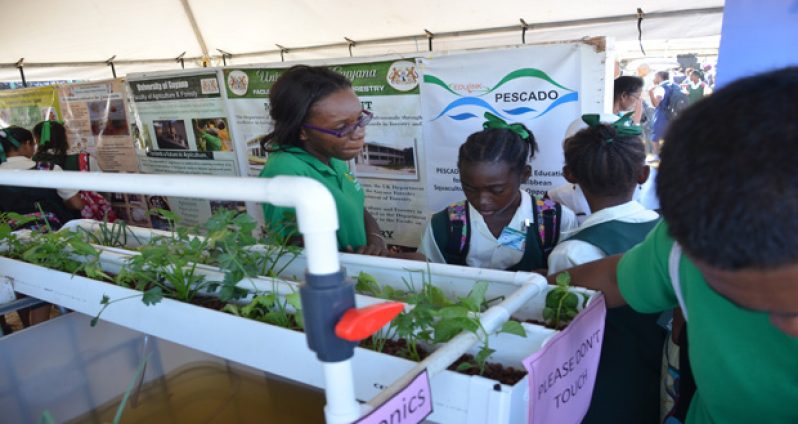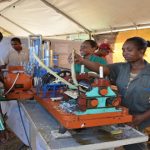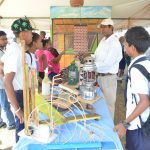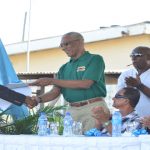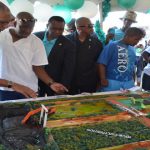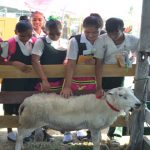THE hinterland region is to become Guyana’s new agricultural frontier, says President David Granger. “The hinterland, particularly our grass lands in the Upper Demerara/Berbice, that is, the intermediate savannahs and in the Rupununi will become our new agricultural frontiers,” Granger said at yesterday’s observance of World Food Day 2015.
President Granger said the grasslands located in those areas will help to “produce greater quantities of food” for local consumption as well as export to sister Caribbean states.
“The Caribbean food import bill is more than $4B a year, the Caribbean has the market, Guyana has the land and our people have the skill. Together we can bring these resources, our capital, our talent and our land to bear on this huge food-import bill in our region,” the Guyanese Head of State posited.
He explained that the Ministry of Agriculture’s focus would be on “pasture development on orchards and beef and dairy development and infrastructural rehabilitation and development.”
“We are on the move. Our government, even as we open up new farmlands in the hinterland, promise not to neglect agriculture on the coastland. We promise to continue to support coastal agriculture since coastal agriculture, our rice lands and sugar lands remain the bedrock of our production,” he added, stressing that Guyanese must never be hungry again.
Government, he said, will be seeking to move to more value-added food production. “We will seek greater investments in agro-processing and we would take steps to stimulate cottage industries what we call bottom house industries – thereby creating jobs, providing reliable sources of income particularly for women and young people coming out of school.”
President Granger said it is important that the cycle of rural poverty be broken. “Our government is determined to ensure greater food security and in so doing, we must produce food in greater quantities, we must protect societies from hunger, we must promote better nutrition and health and we must provide employment in rural and hinterland areas for our young people and we must support our local farmers and we must achieve, together, a poverty-free country.”
Hunger and poverty, the president stressed must be alleviated. Speaking at the Uitvlugt Community Centre Ground on the West Coast of Demerara, the president said food security will exist in Guyana when “all Guyanese everywhere have access to sufficient, safe, nutritious food to maintain a healthy and active life.”
He referenced the FAO’s three pillars on which food security stands, stating that availability of food in sufficient quantities and consistently, access to resources to obtain appropriate food for a nutritious diet and food use are critical.
“These are the three pillars we hope to strengthen in (Guyana) and throughout the Caribbean Region over the next 15 years. Food security is important because it will enhance our ability to eradicate extreme poverty.”
The President stressed that understanding the most vulnerable sections of the population is also critical to eradicating poverty.
Additionally, President Granger said food security is affected by Climate Change and as such it is important that agriculture is made “more resilient.”
“Our challenge therefore is to make agriculture more resilient, especially to protect us from the effect of the cycle of drought and flood. We also need to ensure greater food security where poverty is more concentrated. For these reasons our government will focus on the development of inland and hinterland agriculture, specifically within the intermediate and Rupununi savannahs.”
President Granger reminded Agriculture Minister Noel Holder of APNU+AFC’s campaign promise to hinterland communities to establish regional agricultural institutes to train young people. “We need to ensure that training facilities exist so that young people that leave secondary school they can go into these hinterland agricultural institutes.
“In this regard, I’d like to hold the Minister of Agriculture to campaign pledge which I made to the hinterland that during his tenure in office, however long or short it would be, he would establish a regional agricultural institute in every agricultural region.”
Guyana, he said, joined the international community in pledging to end hunger, to achieve food security, to stamp out poverty and establish sustainable agriculture.
“Food security is necessary but it is not sufficient a condition to eradicate extreme hunger and poverty. Increased agricultural productivity, according to the FAO, benefits the poor by reducing the price of food, it benefits the poor by increasing incomes for the poor, it benefits the poor by stimulating greater demand in agricultural areas, where most of the world’s poor live,” the President said.
CYCLE OF RURAL POVERTY
Social Protection Minister Volda Lawrence, in brief remarks, said the cycle of rural poverty has been pervasive resulting in many families falling prey, generation after generation. “You would agree that this trend cannot continue and it is time for us to break the cycle of rural poverty. Hence, World Food Day is a great opportunity to emphasise the message of zero tolerance for hunger and poverty and the need for countries, donors and civil society to work towards sustainable initiatives to reduce hunger and eradicate poverty.”
Lawrence stressed the need to forge links and promote “greater policy coherence and synergies between social protection, food security, agricultural development and rural poverty reduction.” Guyana is collaborating with the FAO to ensure strategies on better governance of food security are strong.
“Social protection entails policies and actions which enhance the actions of poor and vulnerable groups to escape from poverty and better manage risk and human emergencies – including those farmers experiencing flood and drought.”
Social protection, the minister said, can help to promote empowerment by improving risk management, facilitating higher returns and investment by poor people and supporting human capital development. “The outcome of such interventions is certainly a way out of poverty,” she added.
However, she noted that the social protection systems operated by government are not quite as effective as “they tend to suffer from fragmentation, weak coordination and poor targeting of beneficiaries.” Therefore, it is crucial that different sectors of government work to deliver social protection successfully.
“The good news is that efforts are on the way to change those systems in Guyana so that those in real need of help receive it.”
Lawrence stressed that government does not believe in providing financial aid to persons merely to get them out of a difficult situation. “But we believe in empowering them so they can manage their situation, create better lives for themselves and for their families and that is what we will do.”
For this reason, the Ministry of Social Protection is moving to introduce social security benefits for the entire family. “Rather than for one person within the family, we believe it is better to empower an entire family than pay a financial benefit to a single member.”
To benefit, it is important to note that there are pre-requisites. Beneficiaries must ensure that all children attend school, are properly vaccinated and healthy.
The problem Lawrence noted is not so much food insufficiency and insecurity but “consuming what we grow.”
“We continue to consume large amounts of imported foods, most of which are grown locally. We need to trade, balance our imports with our exports. Our import bill in food supplies can be significantly reduced and that source of revenue can be injected into comprehensive social and agricultural policies that support rural household farming,” said Lawrence.
By Ariana Gordon
Meanwhile, subject Minister Noel Holder said Guyana is a food-secure country though climate change is a real threat. Government, he said, is working on Green Agricultural initiatives to impact significantly in rural communities.
Agriculture, Holder said, can be a pillar in which a sustainable and resilient economy is built to bring equity, prosperity and social protection to all citizens.
Reuben Robertson, FAO’s representative to Guyana on the 70th anniversary of the United Nations, said poverty and hunger have become interchangeable. In a FAO message, Robertson spoke to breaking poverty once and for all. He said it is important to act, for it is positive action that would break the cycle of poverty and hunger. He presented the FAO’s latest release for 2015 – A regional overview of food insecurity in Latin America.



.jpg)



